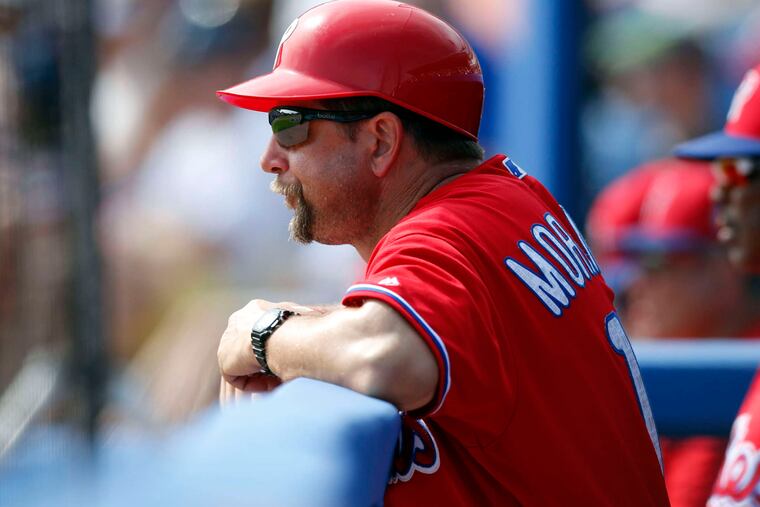Sielski: Morandini is more than his name
CLEARWATER, Fla. - Happens all the time, Mickey Morandini said. He'll be walking down the street, and it could be anywhere. Philadelphia, of course. That's easy and obvious. But elsewhere, too. Maybe in Williamsport, Pa., where he was the manager of the P

CLEARWATER, Fla. - Happens all the time, Mickey Morandini said. He'll be walking down the street, and it could be anywhere. Philadelphia, of course. That's easy and obvious. But elsewhere, too. Maybe in Williamsport, Pa., where he was the manager of the Phillies' single-A affiliate there in 2011. Maybe in Lakewood, N.J., where he managed in 2012 and 2013. Maybe in suburban Allentown or in downtown Reading. Morandini coached in both of those places the last couple of years. Maybe here, now that he's the Phillies' first-base coach. Clearwater's crawling with Phils fans with long memories, after all.
It doesn't much matter where he is. Sooner or later, someone will catch a glimpse of his face, his still-youthful looks hidden a bit beneath a khaki goatee, and recognize him, and pump his hand, and say it.
Hey, I loved the way Harry Kalas said your name . . .
"Or when I go on the Internet to see what people are saying, it's the first thing I see: 'I loved the way Harry said his name,' " Morandini, 49, said Wednesday morning before departing for Dunedin for the Phillies' game against the Blue Jays. "It's a very high percentage of people."
It's rare that an athlete becomes a folk hero based on someone else's pronunciation of his name. Morandini is one such athlete. Kalas, the longtime Phillies broadcaster, who did TV or radio play-by-play for most if not all of the 972 regular-season and postseason games that Morandini played for the Phillies, put him on that pedestal. You had to hear it to appreciate it: the way Kalas stretched those six syllables into a rich mini-symphony of sound, accenting the consonants as if he were striking a snare drum, blending one vowel into the other like a color wheel.
Over Kalas' 38 years with the Phillies before his death in 2009, he and those who listened to him had plenty of names to savor, from a superstar like Michael Jack Schmidt to a journeyman pitcher like Don Carman (picture Carman's name, as Kalas would utter it, with another dozen Rs). But none matched the pleasure of his saying Morandini or of anyone's hearing him say it.
Morandini enjoyed hearing it, too, but the enjoyment went just so far. It's a complicated thing. It's nice that people who follow the Phillies still remember him, mostly because of Kalas, but it would be nicer still if they remembered him, too, for what he accomplished in the game. He lasted a long time in the majors for a 5-foot-11, 170-pound second baseman without much pop in his bat - eight-plus years with the Phillies, two with the Chicago Cubs, a stint with the Blue Jays.
He delivered a big hit in one of the biggest victories in Phillies history - the two-run triple that put the finishing touch on a 6-3 win over the Atlanta Braves in the clinching game of the 1993 National League Championship Series. He played in a World Series. He was a member of the U.S. Olympic team. He turned an unassisted triple play in 1992, the first in the National League in 24 years. He had 40 doubles one season. He made the all-star team.
"I think I got the most out of my ability," he said. "I didn't throw the hardest. I didn't run the fastest. I wasn't the strongest hitter. But I got a lot out of my ability. I was able to play 11 years, and I think that's saying something right there. I got the best out of my ability and played the game the right way. A lot of people respected me for that.
"I did some pretty good things."
He would like to manage in the major leagues someday, he said. It's why he spent the previous five years riding buses in the minors, paying his dues, and it is part of the reason he is on Pete Mackanin's staff now. Those guys on the '93 team, particularly the club's starting catcher and leader, Darren Daulton, taught him how to be a ball player, he said - how to handle the media, how to play through a nagging injury, "things you don't see nowadays. Guys don't really like to play hurt." That team was loaded with ornery veterans, and Morandini has never been around a team as young as this year's Phillies will be. He would like to teach them some things, help them develop as players, show them some of what he knows and what he did to learn it.
He would like to be more than his name. Wouldn't anyone?
@MikeSielski